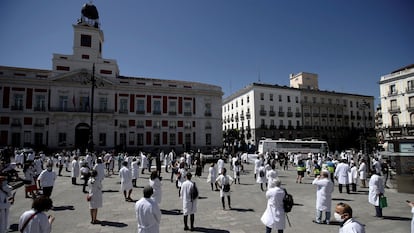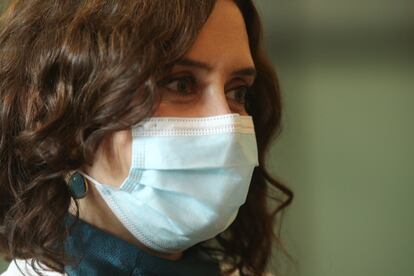Madrid’s primary healthcare crisis: not enough doctors for so many patients
Regional leaders have pledged to invest €80 million to revamp an underresourced system, but professionals are skeptical as they struggle to cope with a second wave of Covid-19

The numbers don’t tell the whole story of the dramatic situation facing Madrid’s understaffed primary healthcare professionals as they try to cope with a second Covid-19 wave.
Doctors on the frontline of the fight against the coronavirus are seeing over 80 patients on average during a single shift, according to unions. Their efforts are aimed at making up for a shortage of 600 family physicians and 150 pediatricians in the region, according to the same sources.
But they are being stretched to the limit, as the pandemic forces them to deal with lines of patients who show up without an appointment, inside buildings that are often old and lacking natural light or proper ventilation.
I used to be able to end my work day and tune out until the next day. But not any more. That’s how stressed I amSalvador Casado, doctor in Soto del Real (Madrid)
The main union representing primary care doctors in Madrid, Amyts, has called an indefinite strike starting on September 28. In a statement, the union said that “every day, they [doctors] are facing unmanageable agendas in deplorable working conditions, which prevents them from offering patients any kind of quality care.”
“Primary care is overwhelmed,” summed up Jesús Redondo, a family doctor at the Ramón y Cajal healthcare center. “When the state of alarm was lifted, it looked like we might get a break, but it wasn’t the case. At that point, our staff numbers went down as some people took vacations and others requested leaves. Between late June and now, [the workload] has been growing nonstop, in precarious conditions.”
“The pressure keeps increasing,” agreed Salvador Casado, a family doctor in Soto del Real. “I used to be able to end my work day and tune out until the next day. But not any more. That’s how stressed I am ... some colleagues tell me ‘I’m scared of going in tomorrow.’”
The problems that already existed in March have been compounded by the fact that many healthcare professionals caught the virus, while others were transferred to the Ifema field hospital, causing dozens of healthcare centers to temporarily shut down. Six months later, not all of them are operational.
Madrid is also one of the regions with the worst primary-doctor-to-patient and nurse-to-patient ratios in the country. It spends the least on public healthcare, and its professionals are third from last on the salary scale, according to national statistics released by the Health Ministry.
Investment promises
The regional premier, Isabel Díaz Ayuso of the Popular Party (PP), this week promised to invest €80 million over three years to revamp the system. Ayuso said that the new plan “will improve working conditions” and “progressively increase staff numbers with the goal of reducing the pressure.”

But the unions reacted coolly to the announcement: they think it comes too late, and that the second wave of Covid-19 could soon blow up in everyone’s faces. “Those are just headlines,” added Julián Ezquerra, of the medical association Asociación de Médicos y Titulados Superiores. “This same proposal could have been made during the confinement. Right now we are clearly experiencing a new outbreak.”
The political opposition has reacted in similar terms. “The plan involves spending only an additional four euros per inhabitant per year, considering that we are €72 shy of the national average,” said Mónica García of Más Madrid.
“Action is required now. If primary care goes down, the hospitals go down,” said Jesús Santos of the leftist Podemos. “And if the hospitals go down, we all go down.”
The situation in Spain
“Due to a shortage of resources, excessive workloads and poor management by health authorities, the public healthcare system’s centers have for several years now been the least attractive place to work in medicine and pediatrics.”
Primary doctors also note that in some highly populated regions, they have been tasked with contact tracing and other jobs that in theory should not fall to them, such as giving parents slips to justify missed school days.
English version by Susana Urra.
Tu suscripción se está usando en otro dispositivo
¿Quieres añadir otro usuario a tu suscripción?
Si continúas leyendo en este dispositivo, no se podrá leer en el otro.
FlechaTu suscripción se está usando en otro dispositivo y solo puedes acceder a EL PAÍS desde un dispositivo a la vez.
Si quieres compartir tu cuenta, cambia tu suscripción a la modalidad Premium, así podrás añadir otro usuario. Cada uno accederá con su propia cuenta de email, lo que os permitirá personalizar vuestra experiencia en EL PAÍS.
¿Tienes una suscripción de empresa? Accede aquí para contratar más cuentas.
En el caso de no saber quién está usando tu cuenta, te recomendamos cambiar tu contraseña aquí.
Si decides continuar compartiendo tu cuenta, este mensaje se mostrará en tu dispositivo y en el de la otra persona que está usando tu cuenta de forma indefinida, afectando a tu experiencia de lectura. Puedes consultar aquí los términos y condiciones de la suscripción digital.








































